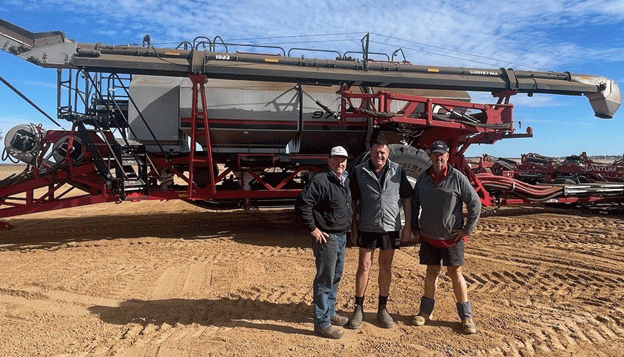It’s been a challenging season for Western Australian growers, particularly in the northern wheatbelt where dry conditions have tested the resilience of many farmers. The Messina family, who manage Spring Park Farms across Mullewa to Dongara, faced these harsh realities but found a silver lining in their use of the new Morris 10 Series air cart. This advanced seeding technology has enabled them to plant more hectares accurately and efficiently, despite the difficult start.
Overcoming Harsh Conditions
Brothers Rod and Drew Messina, along with their wives Sam and Tracey, cultivate wheat, canola, and lupins over approximately 16,000 hectares. This year, due to dry conditions, they left 3,000 hectares fallow. Their land comprises primarily sandplain and some red loam soils. Up until recent rainfall, some farms had received only 28mm of rain since February, with minor rainfall on coastal land.
The Messinas, experienced in using various seeding systems, took the opportunity to trial the Morris 10 Series air cart this season. They also use John Deere air carts and drills and a Morris 9 Series air cart with a disc seeder. Rod Messina highlighted the benefits of the Morris 10 Series, noting its load cells and small seeds box, which the 9 Series lacked.
Enhanced Efficiency and Productivity
One of the standout features of the Morris 10 Series is its tank capacities, which are designed to accommodate common application rates: 70kg/ha of wheat and 100kg/ha of fertilizer. The family typically uses these rates along with 55 liters/ha of liquid nitrogen fertilizer. Rod explained that the granular tanks of the 10 Series, being of the same size, allowed them to seed 120 hectares from one fill. With canola, they could fill the main tanks with 25 tonnes of fertilizer and seed up to 200 hectares, depending on the seed rate.
A fully integrated, stainless-steel liquid tank in the 10 Series allowed the Messinas to increase their liquid nitrogen rate to 65 liters/ha, significantly boosting productivity. “It’s certainly out in the paddock a lot longer with the canola; we can complete almost 300 hectares in a shift,” Rod said, praising the efficiency of the cart’s conveyor system.
The innovative design of the small seeds tank, now a larger dual-purpose Optimizer Tank, allows for optimizing the capacities of the main granular tanks. This feature, coupled with rate optimization, ensures that all tanks empty simultaneously, minimizing downtime and enhancing efficiency.
Precision and Control
Rod Messina emphasized the importance of the load cells and automatic calibration correction in achieving accurate application rates. With the associated app, the Messinas can read the scales from the truck, ensuring precise kilos for the hectares being planted. This accuracy is crucial, given the high costs of inputs. Rod noted that they are now extremely close to their calibrated rates, reducing wastage significantly.
The Morris 10 Series also features electric metering powered by a brushless alternator and motors, maintaining the renowned Morris spiral-fluted metering wheels. This technology supports the accurate application of low seeding rates, which is vital for crops like canola.
Despite the tough start to the season, the Morris 10 Series air cart provided the Messina family with the tools needed to manage their seeding program more effectively. Its innovative features and precision engineering have proven invaluable in maximizing efficiency and productivity under challenging conditions. As Western Australian farmers continue to face climatic challenges, advanced agricultural technology like the Morris 10 Series will play a crucial role in ensuring sustainable and profitable farming practices.
Error




